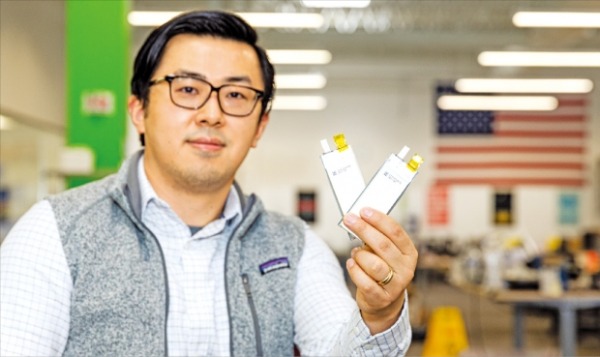
Chi Chao Hu, the founder of Solid Energy Systems, shows a prototype lithium metal battery being developed jointly with GM at a research and pilot production facility in Boston. Provide SES
“There will be disruptive innovations in the electric vehicle industry in 2025,” said Qiqiao Hu, founder and CEO of Solid Energy Systems (SES). He predicted that the rapid rise of next-generation battery technology that uses solids such as metal as an electrolyte instead of liquids, “the control of the battery will gradually pass over to automakers such as GM, Volkswagen, and Hyundai.” SES and GM last month announced plans to build a plant for pilot production of lithium metal batteries. The Korea Economic Daily conducted an interview with the CEO after living in Boston, USA through video on the 5th.
▷ In what fields are you cooperating with GM?

“We are jointly developing a high-density lithium metal all-solid battery. The new battery technology is applied to automakers through sample stages A, B, C, and D. I am making GM and A samples, and this process takes the most time. When sample A, which determines whether or not it can be installed, is completed, the application test for each model is performed. The goal of completing the A sample is 2023, and the final commercialization time is set to 2025.”
▷ How did your relationship with GM begin?
“The year GM made its first investment was in 2015. It acknowledged that SES is not only the closest to commercialization of solid-state technology, but also has excellent technology for battery control system (BMS) based on artificial intelligence. In March, a significant technology development agreement (JDA) was held. In Boston, the two companies are planning to build a production plant to make lithium metal all-solid battery cells. GM continues to pay money for our technology development, and SES has no restrictions on using GM’s R&D (R&D) manpower.”
▷ When did SK Group invest?
“I invested in the Series C+ stage in 2018. It was the largest single investor at the time. That is why I became the second largest shareholder.”
▷Why is an all-solid-state battery important?
“GM and Hyundai Motor Company declared that they will transform into electric vehicle manufacturing companies from 2035. Who can first make a high-efficiency battery cell with safety at low cost will determine the luck of global automakers. In the automobile and battery industry, there is no disagreement that each company’s competitiveness will be judged by 2025. Commercialization of all-solid-state batteries is key.”
▷ The battle for global battery initiative is intensifying.
“Like Moore’s law of semiconductors (the law that the density of semiconductors doubles every 18 months), there are laws about energy density in the battery industry. The density doubles every 30 years. Lithium metal batteries were invented in the 1970s. It means that the point of commercialization is approaching.”
▷ Is it possible for finished car makers to produce their own batteries?
“It is natural that finished car makers are trying to reduce their dependence on existing lithium-ion battery suppliers. You can develop your own battery, or you can choose to jointly develop it with a company with new technologies such as all-solid-state batteries. Existing lithium-ion battery manufacturers are also jumping to develop next-generation batteries. Until now, all possibilities are open.”
▷ The possibility that the all-solid-state battery developer will take control?
“It won’t be. Unlike lithium-ion, next-generation batteries can be developed by automakers. Startups like SES need funding, and global automakers need technology. The mid-term business model of SES from 2025 to 2026 is to supply materials such as anodes, electrolytes, and separators to automakers, and to license IPs (intellectual property rights) related to solid-state batteries such as lithium metal.”
▷ How do you see Korea’s lithium-ion battery competitiveness?
“The scientists who developed the lithium-ion battery are from the United States, the United Kingdom, and Japan. These three received the 2019 Nobel Prize in Chemistry. The US is leading the global market in the upstream of developing and making battery materials and the downstream manufacturing of finished vehicles, but in the midstream area of mass-producing batteries, Korea has taken the lead. US companies weren’t interested in mass-producing lithium-ion batteries. Korean companies have filled this gap. Three Korean battery suppliers are gathered with KAIST at Daedeok Research Complex in Daejeon, which means that they are working on battery industry-academia cooperation, which the US could not. The Chief Technology Officer (CTO) of SES is also a Korean from Samsung SDI.”
Reporter Park Dong-hui [email protected]
